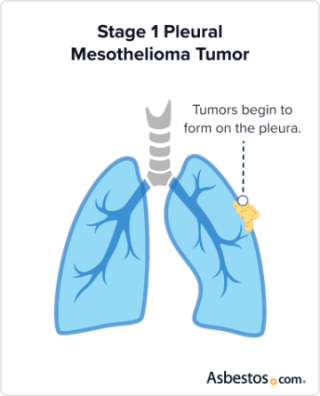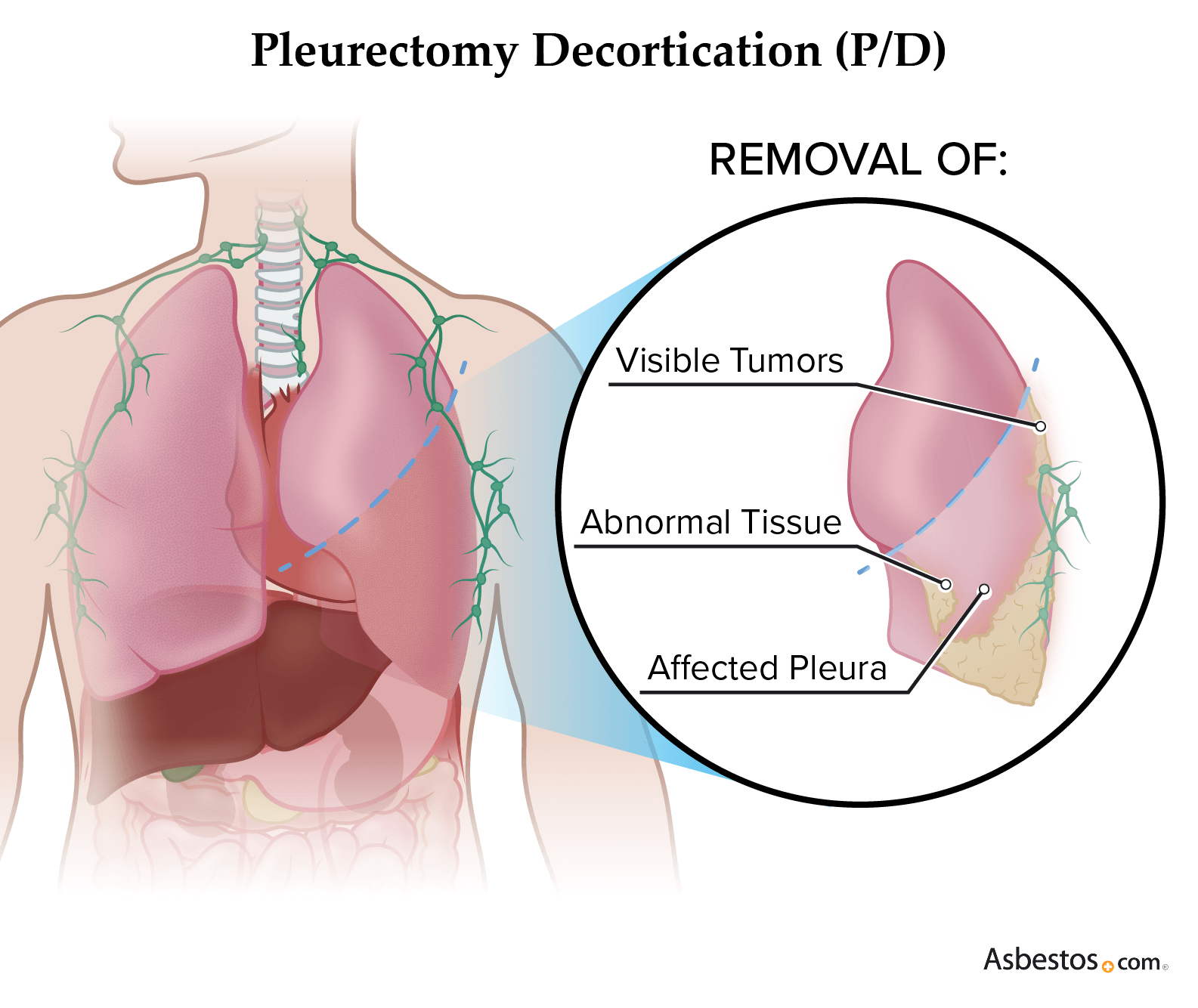Kevin Hession experienced 4 bouts of pleurisy and underwent exploratory surgery before being diagnosed with stage 1B pleural mesothelioma in 2021. With his rare early-stage diagnosis, Kevin was able to begin chemo quickly and continues treatment today. Now he stays active and focuses on enjoying life.
Stage 1 Mesothelioma
Stage 1 mesothelioma is the earliest stage of the cancer and has the most treatment options. The tumor is localized in the patient's chest or abdomen lining and symptoms are mild, often mistaken for other illnesses. If identified, timely treatment can improve patients’ prognosis and quality of life.
What Is Stage 1 Mesothelioma?
Stage 1 mesothelioma is the least advanced stage of this asbestos-related cancer. At this stage, the cancer is localized, so it hasn’t spread beyond the lining of the lungs, abdomen or lymph nodes. Early diagnosis can lead to more effective treatment and a better prognosis. However, symptoms are often mild and mistaken for common conditions such as the flu or a cold, making early detection challenging.

Mesothelioma in stage 1 has two substages: 1A and 1B. Tumors that form in the pleural lining on one side of the chest or in the parietal pleura are stage 1A. Stage 1B tumors develop in all layers of the pleural lining, covering the chest, lungs, and mediastinum on one side of the patient’s chest. Early diagnoses of stage 1A and 1B are often by chance during an X-ray or CT scan meant to examine the patient for other health conditions.
There are several staging systems for evaluating the presence of cancer and how far it has spread. Tumor-node-metastasis is the most commonly used to stage pleural mesothelioma, the most common type of mesothelioma tumor.
Peritoneal mesothelioma (abdominal mesothelioma) is the second most common type of this cancer and affects the lining of the abdomen. Other types are pericardial mesothelioma, a very rare cancer that forms in the pericardium (the lining of the heart), and the rarest type, testicular mesothelioma, which affects the lining of the testicles. There is no official staging system for these cancers because they are so uncommon. However, doctors generally consider cancers to be in an early stage if they haven’t yet spread in the body.
Symptoms of Stage 1 Mesothelioma
At stage 1 mesothelioma, most patients don’t have symptoms. Some symptoms, such as chest pain and tightness, are so mild they don’t feel they need medical attention. This is because the tumor is still small and hasn’t spread yet, making it difficult to diagnose early. However, a few people report mild signs in the first stage of mesothelioma.
For example, a 63-year-old man had shortness of breath and chest tightness. A CT scan showed pleural thickening and nodular lesions. A biopsy confirmed the presence of lymphohistiocytoid MPM, a stage 1A mesothelioma, necessitating surgery. This followed a final diagnosis of sarcomatoid MPM, stage 1B mesothelioma. With the accurate diagnosis of the cancer, quick treatment was successful.
- Body aches
- Chest pain
- Chest tightness
- Fever
- Shortness of breathing
- Persistent dry cough
This patient’s symptoms mimicked other illnesses such as pneumonia, flu or lung cancer, which could easily have led to misdiagnosis. However, abnormal mass tissues in the chest area and pleural effusions on imaging tests proved otherwise. When there are common signs of a tumor forming in the chest or lung area, a biopsy can confirm the presence of mesothelioma.
Diagnosis of Stage 1 Mesothelioma
Diagnosing stage 1 mesothelioma without advanced medical equipment and examination is extremely difficult. It is often discovered by accident, during regular cancer screening, or when the doctor performs a CT scan or X-ray testing for other medical conditions.
People with a history of asbestos are encouraged to undergo mesothelioma screening to detect any warning signs of cancer. Early diagnosis can improve treatment outcomes.
Treatment Options for Stage 1 Mesothelioma
Mesothelioma treatment for stage 1 includes surgery, chemotherapy, radiation, immunotherapy and clinical trials. For better outcomes, doctors can combine approaches with multimodal therapy. This stage offers the most mesothelioma treatment options.
- Surgery: Often the primary treatment for stage 1 mesothelioma, surgery usually removes visible tumors.
- Chemotherapy: Doctors administer this treatment independently or in combination with surgery. It involves injecting drugs directly into the bloodstream or the affected area to kill the cancer cells.
- Radiotherapy: Administered after surgery, radiation therapy uses high-energy X-rays to kill the cancer cell or shrink the tumor.
- Immunotherapy: This type of cancer treatment boosts a person’s body’s immune system to target and destroy cancerous cells.
- Multimodal therapy: This treatment combines radiation, surgery and/or chemotherapy options. A 2021 report shows that multimodal treatment may improve the life expectancy of stage 1 and stage 2 pleural mesothelioma patients.
- Clinical trials: These test emerging therapies or experimental drugs to discover more effective ways to treat cancer.

The best way to treat stage 1 mesothelioma is by combining several therapies. However, various factors will influence your choice of and options for treatment. These include your overall health, age, cancer type and location of the tumor. For example, some pleural mesothelioma patients have been able to prolong their survival rate by opting for pleurectomy and decortication.
Mesothelioma specialist and thoracic surgeon Dr. Jacques Fontain told us, “When mesothelioma is limited to the chest and hasn’t spread to the lymph nodes, I usually recommend a combination of chemotherapy and surgery, and in some cases, radiation. This approach can offer the best chance at extending survival.”

Understand your diagnosis, top doctors and ways to afford care.
Get Your Free GuideStage 1 Mesothelioma Prognosis and Survival Rates
With treatment, stage 1 pleural mesothelioma patients often live between 12 and 21 months. The 5-year survival rate for stage 1 pleural mesothelioma is 22.5%. Stage 1 peritoneal mesothelioma patients may live longer than 5 years with appropriate treatment. The 5-year survival rate for peritoneal mesothelioma is 87%. Factors such as the type of mesothelioma, cell type, available treatments, age and overall health impact survival rates.
I’ve kind of embraced it. I don’t feel sorry for myself. I’m not mad. I’m not sad. I’m actually very much at peace with all of this. Mesothelioma is something I have, but it’s not defining who I am.
Younger stage 1 mesothelioma patients in good health have a better prognosis than older patients in later stages facing multiple health issues. The former have a high 5-year survival rate and some live for over 10 years, while stage 4 patients have the lowest survival rate — approximately 7% survive 5 years.
Three types of cells make up mesothelioma cancer: epithelial, sarcomatoid, and biphasic. Epithelioid make up approximately 70% of mesothelioma cases and have the highest survival rate. Biphasic cells occur in 20% of cases, and sarcomatoid only 10%. For all types, early detection can improve the prognosis and survival rate of stage 1 mesothelioma patients by enabling early interventions to help slow or prevent the tumor from spreading to other organs.
- The 2025 National Comprehensive Cancer Network Guidelines explain that surgery is the primary treatment for early-stage malignant mesothelioma to achieve complete tumor removal.
- Early diagnosis of stage 1 mesothelioma is critical because surgical and multimodal therapies will be more effective than in later stages.
“This is very important because these are patients that we tend to be more aggressive in multimodal treatment with because they have limited disease to the pleural lining; therefore, it’s important to know their clinical staging from the beginning.”
Commonly Asked Questions About Stage 1 Mesothelioma
- What is the difference between mesothelioma in situ and stage 1 mesothelioma?
-
Mesothelioma in situ is a precursor stage when cancer is localized to its origin. This cancer is typically diffuse with multiple tumors, and in situ implies that tumors haven’t spread beyond where they started. While mesothelioma is in situ, it could affect tissue deep enough to qualify as stage 1.
- How quickly does mesothelioma progress?
- Can mesothelioma be cured if caught early?
-
Mesothelioma is incurable. However, patients in the first stage may manage it through the right treatments, including surgery, radiation and chemotherapy.






